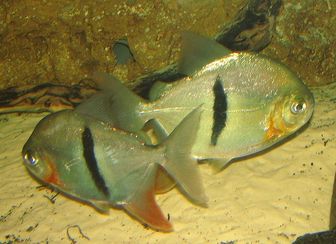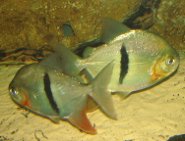Disk tetra

The Disk tetra lives in the benthopelagic, freshwater, pH range: 5.0 - 7.0, dH range: 10 environment.
Disk Tetra - Hates to be Alone
 Disk tetras (Myleus schomburgkii), known in the pet trade as black-barred silver dollars and by ichthyologists as Myleus schomburgkii, are larger than most aquarium fish but possess a fear of being alone. This is so pronounced that even if two or three are kept together, they may attack any other fish in the tank, including each other. Only by keeping them in small schools of at least five fish do they relax.
Disk tetras (Myleus schomburgkii), known in the pet trade as black-barred silver dollars and by ichthyologists as Myleus schomburgkii, are larger than most aquarium fish but possess a fear of being alone. This is so pronounced that even if two or three are kept together, they may attack any other fish in the tank, including each other. Only by keeping them in small schools of at least five fish do they relax.
Why So Paranoid?
Although disk tetras are large in comparison to most tropical fish sold in the pet trade, they make tasty mouthfuls for predators in their native South America. They were eaten numerous birds, reptiles, fish like the giant piraucu and the incredibly rare Amazonian River dolphin. The only defense against this constant bombardment of predators was to stay in large schools. That way, the individual fish has less of a chance of being eaten. Large schools can also stick close together to give the illusion that they are one very large fish instead of several smaller fish.
That’s a Big Fish
Tetras are usually less than an inch or 2.5 centimeters long, but not the disk tetra. They are one of the largest species of tetra known in the freshwater pet fish trade. Because they have a round body, they look more like silver dollars or Metynnis hypsauchen. Disk tetras can grow to a whopping 8.5 inches or 21.6 centimeters in length. Because of their size and that at least five are needed, disk tetras need to be kept in tanks that are at least 50 gallons or 189 liters large.
Diet
Disk Tetras are omnivores that can eat a wide variety of commercial fish foods. In the wild, they would eat small insects, zooplankton, corpses of other fish and river plants. In captivity, they can eat meat-based fish flakes and pellets. This can be the main diet, but they also need some variety in their meals. This can be from dehydrated or frozen brine shrimp, bloodworms or tubifex worms. They also enjoy grapes or spinach chopped into small pieces. Make sure the grapes and spinach are washed before chopping to remove any traces of pesticides.
Common names
Black band myleus in English
Blackear pacu in English
Disk pacu in English
Disk tetra in English
Kiilalevytetra in Finnish (suomen kieli)
Pacu in Portuguese (Português)
Pacu cadete in Portuguese (Português)
Pacu ferrado in Portuguese (Português)
Pacu jumento in Portuguese (Português)
palometa in Spanish (español)
pampano in Spanish (español)
Schomburgks Scheibensalmler in German (Deutsch)
Tallerkentetra in Danish (dansk)
斯氏鋸腹脂鯉 in Mandarin Chinese
斯氏锯腹脂鲤 in Mandarin Chinese

Family : Characidae
Genus : Myleus
Species : Myleus schomburgkii
Authority : Jardine & Schomburgki,1841
